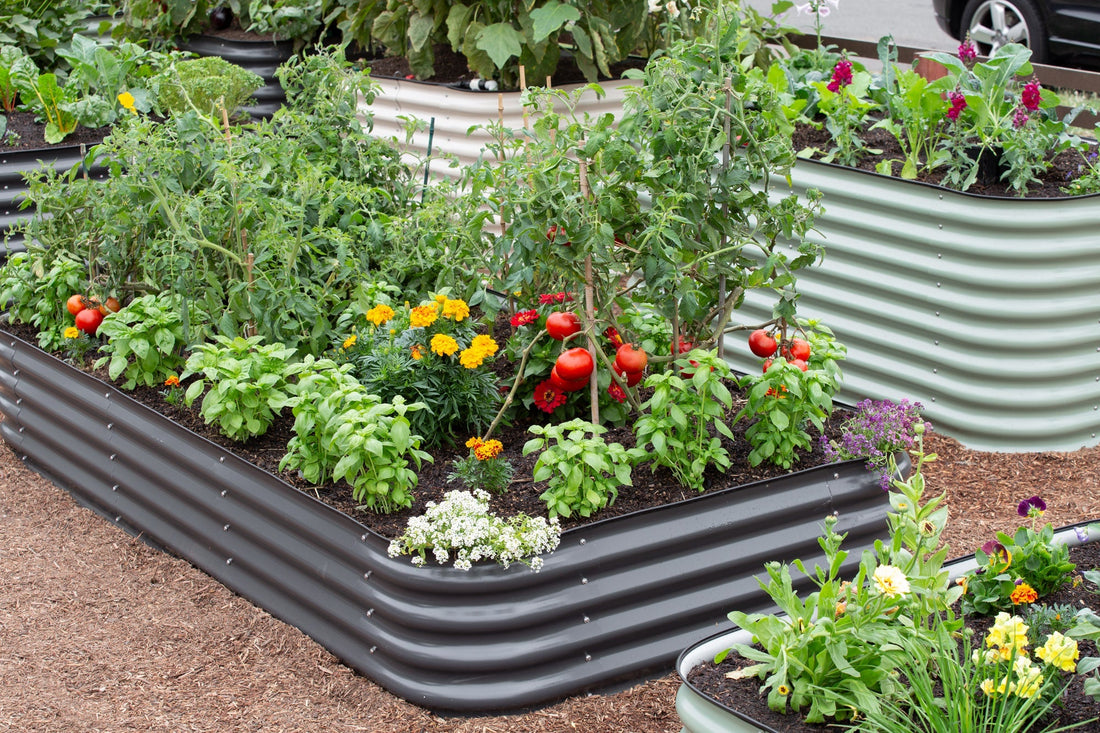
The Environmental Benefits of Using Recyclable Materials in Garden Design with Corten Steel-Style Planters
Share
New Zealand homeowners are becoming more mindful of their environmental impact. From how we heat our homes to the way we landscape our yards, every decision counts. Gardeners across the country are starting to rethink the materials they use, especially when it comes to containers and raised beds. One standout option that’s gaining attention? Corten steel style planter boxes.
These planters offer the warm, weathered look of corten steel without using the actual alloy, and many are crafted from recyclable materials. They're sturdy, long-lasting, and more aligned with today's focus on low-waste choices.
What Makes a Planter Sustainable?
When we talk about sustainability in the garden, we’re often referring to how products affect the environment throughout their life—from production to disposal. A good planter should last many seasons, be made from materials that can be reused or recycled, and require little maintenance.
Many corten steel-style planters check all those boxes:
- Durable design: These planters don’t crack, split, or rot like timber.
- Recyclable materials: Most are made using coated or galvanised steel, which can be recycled locally in New Zealand.
- Low maintenance: No repainting or sealing is required, unlike wooden alternatives.
Using recyclable garden products like these can significantly reduce garden waste and help households shift toward more sustainable habits.
The Lifecycle of Corten Steel-Style Planters
While they look like true corten steel, these planters are often made from materials like Aluzinc or powder-coated galvanised steel. They are lighter, less reactive, and easier to manufacture sustainably.
How They’re Made
- Raw materials: Often include steel alloys that are coated to protect against rust.
- Coating: May involve a paint or zinc layer that provides the rust-coloured patina.
- Assembly: Modular designs allow for easy flat-pack shipping, reducing carbon emissions from transport.
What Happens After Use?
Because they’re metal-based, they can be recycled through standard scrap metal facilities across New Zealand. Compared to plastic or treated timber, that’s a big win for the environment.
Benefits Beyond Aesthetics
While these planters look good, they also bring a range of practical and environmental benefits:
- Long lifespan: Reduces the need for replacements.
- Minimal packaging: Many are shipped flat-packed to reduce shipping materials.
- Supports low-waste landscaping: Fewer broken pots, less landfill.
All of these points make them a great addition to any sustainable garden design NZ residents are aiming for.
How These Planters Help With Low-Waste Landscaping
Waste reduction isn't just about composting and choosing native plants. It also involves selecting materials that won't break down quickly or contribute to landfill after just a couple of seasons. The containers we choose can quietly contribute to a lot of waste over time. That's why it's worth taking a closer look at what we place in our gardens.
Long-Term Durability
One of the most effective ways to reduce waste is by choosing products that last. Corten steel-style planters are built to withstand New Zealand’s wet winters, dry summers, and sudden temperature shifts. Unlike wooden or plastic planters, they don't warp, crack, or splinter.
That means no seasonal replacements, no repairs, and no urgent runs to the hardware store every time the weather takes a turn.
Durability reduces demand. When fewer planters need to be produced, transported, and replaced, the overall environmental footprint shrinks. That’s a win for your garden and for the planet.
Safe and Soil-Friendly Materials
These planters often feature non-toxic coatings or are made from alloys that don’t leach chemicals into the soil. That makes them suitable for growing herbs, vegetables, and even sensitive native species without compromising soil quality.
In contrast, some treated timbers and certain plastics can release substances into the garden bed over time—especially when exposed to moisture and sun.
This makes corten steel style options a better choice not just for sustainability but for safer, healthier growing environments.
No Urgent Disposal Requirements
With longer-lasting planters, you don’t need to constantly worry about replacing broken containers or figuring out how to dispose of them responsibly. Many households don’t have access to plastic recycling for garden items, and timber treated with chemicals is not accepted at all council facilities.
Choosing a material that will last upwards of 10–20 years shifts the mindset. Instead of treating planters as disposable, they become part of the garden’s structure—something you can depend on season after season.
Reducing Packaging Waste
Many corten steel-style planters come flat-packed with minimal packaging. They’re easy to assemble and don’t require bulky protective materials that end up in your wheelie bin. Compared to heavy ceramic pots or plastic containers wrapped in layers of foam and cardboard, this makes a noticeable difference.
Less packaging doesn’t just reduce rubbish—it also cuts back on emissions from freight and warehousing.
Promoting Smarter Garden Planning
Because these planters last so long, gardeners tend to take more care in how they use them. It encourages forward thinking. Instead of quick fixes or seasonal gimmicks, homeowners make thoughtful decisions about layout, plant types, and long-term design.
That careful approach leads to less waste from failed plantings, rushed repotting jobs, or unnecessary garden makeovers. It helps create outdoor spaces that evolve rather than restart every spring.
Practical and Planet-Friendly
When it comes to low-waste landscaping, the best approach is often the simplest: choose quality over quantity. Corten steel-style planters meet that standard. They offer long service lives, require little to no maintenance, and help households keep more waste out of landfills.
In short, they support a way of gardening that feels good and does good—without overcomplicating things.
What Planter Materials Are Environmentally Friendly?
Metals like galvanised steel, when recycled or recyclable, are a good eco-conscious choice. Materials like untreated wood can also be sustainable if sourced locally.
Why Corten Steel Style Is A Popular Choice
The rusted look gives a natural, earthy tone that blends well with native New Zealand plants. It’s a finish that adds charm without being loud. But it’s not just about the look.
Benefits Of Corten Steel Style For Home Gardeners
- Matches many home exteriors
- Doesn’t require extra staining or sealing
- Withstands sun, rain, and temperature swings
Homeowners in areas with unpredictable weather find these planters hold up better than other options.
Eco-Friendly Gardening Starts With Smart Material Choices
Being eco-friendly isn't always about big gestures. Sometimes, it's as simple as choosing planter boxes that New Zealand homeowners can use year after year. When materials are reusable and recyclable, they contribute to a greener lifestyle.
Simple ways to start:
- Avoid plastic planters with limited lifespans
- Choose weather-resistant metal options
- Reuse or repurpose wherever possible
These decisions help reduce the demand for single-use items in the garden.
Are Metal Garden Planters Safe?
Yes, most metal planters are safe, especially those coated or designed for gardening. Just make sure they’re free from harmful coatings.
Keeping It Local: NZ’s Push for Sustainable Products
The New Zealand Ministry for the Environment has released multiple strategies aimed at reducing household waste. Choosing recyclable garden products helps households align with these national efforts.
According to the Ministry’s Waste Reduction Plan, steel and metal recycling rates are higher than plastics. That means these planters are more likely to be reused and less likely to contribute to landfill.
The Practical Side of Recyclable Garden Products
People often ask, "Will metal planters rust or stain my patio?" Good question. Corten steel-style planters usually come with a protective coating that prevents staining. And since many products are raised off the ground or come with feet, moisture drainage is less of an issue.
What to look for:
- Protective powder coating
- Drainage holes
- Modular assembly for easy upgrades
How Long Do Corten Steel-Style Planters Last?
They can last 10 to 20 years or more, depending on material thickness and exposure. Some lighter-weight versions still offer 8–10 years of use with minimal care.
What To Avoid When Choosing Planters
Here are some things to keep an eye on:
- Plastic: Often ends up cracking in the sun or becoming brittle.
- Treated timber: Can leach chemicals into the soil.
- Ceramic: Looks good but breaks easily and isn’t recyclable.
Choosing a well-built corten steel style option solves many of these issues in one go.
What Is The Most Durable Material For Planters?
Metal and fibreglass tend to be the most long-lasting. Corten-style steel provides a mix of durability and aesthetic appeal.
Combining Style With Purpose
Eco-conscious doesn’t have to mean boring. These planters allow you to bring a modern, clean look to your outdoor space while sticking to values of reusability and low-impact gardening.
Design tips:
- Group different sizes for visual balance
- Use with native shrubs or herbs for low-maintenance care
- Pair with gravel or reclaimed timber paths for a cohesive look
Are Corten-Style Planters Better Than Wood?
Yes, if you're after longevity and low maintenance. Wood can rot or attract pests over time, while corten-style metal stands up to the elements.
A Closer Look At Material Recovery In NZ
Aluzinc, galvanised steel, and coated metals are widely accepted at recycling centres in major NZ cities. This means that when your planter reaches the end of its life (which won’t be soon), it can be processed and reused.
Accepted by:
- Auckland Council recycling depots
- Christchurch EcoDrop
- Wellington Southern Landfill metal recovery
These local options support a full-circle lifecycle for garden products.
Can I Recycle Metal Planters In New Zealand?
Yes. Most councils accept metal-based products at their recycling stations. Check your local guidelines for drop-off points and preparation tips.
Choosing Planter Boxes That Match Kiwi Lifestyles
New Zealand gardens come in many shapes and sizes—from balcony patches to sprawling rural backyards. The great thing about corten steel-style planter boxes is they’re versatile enough for all of them.
They’re popular not just because they last but because they work with different lifestyles. Whether you’re growing herbs for dinner or adding structure to your flower beds, these planters bring ease and function.
Why Are People Switching To Metal Planters?
Because they’re more durable, weather-resistant, and easier to recycle, homeowners are moving away from short-lived options toward something more reliable.
Your Way To A Greener Garden
Choosing planters made from recyclable materials is a small but effective way to contribute to better environmental outcomes. With corten steel-style options, New Zealand homeowners can keep their gardens tidy and stylish while reducing waste.
It’s one of those rare cases where doing what’s good for your backyard is also good for the planet. These planters not only enhance the visual appeal of your space but also offer a responsible alternative to short-lived garden containers. They reflect a more thoughtful approach to outdoor living—one that respects nature without sacrificing style.
If you’re looking for quality corten steel-style planter boxes that combine durability with design, check out the range available at Birdies Garden Products NZ.

 Australia
Australia United States
United States



